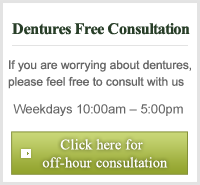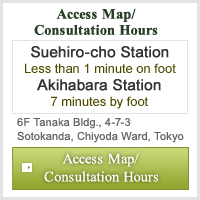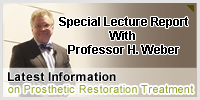2010年6月 6日 - 2010年6月12日 « トップへ » 2010年7月11日 - 2010年7月17日
2010年6月16日
What is the lifespan of implants and the telescope system?
Q. What is the lifespan of implants and the telescope system?
A. When I graduated college 12 years ago, there were very few dentists who were treating with implants.There were also very few students studying in the implants department and you can say that it wasn't very popular. In recent years, however, nearly all clinics offer implants. In the last year alone, the research association with the most astounding growth in number of members has been the Japanese Society of Oral Implantology. They gained 1,345 members just last year. It is even said among dentistry circles that we are experiencing and 'implant bubble'.
It is written that implants have a lifespan of 40 years. However, does this estimate reflect the case scenarios from each clinic? 12 years ago no dentists were even offering implants so this information is hard to believe.
Of course this can be possible if the patient has never suffered from gingivitis, has never had a systemic illness, and has perfect bite alignment. But I think that we need to be careful about making overestimations.
Implants are not natural teeth so they will not develop cavities. However, gums are not artificial. Without proper care it is easy to develop gingivitis. The circumstances change even more if you are a smoker. It is important to seek correct information and counseling from a dentist before getting implants.
Generally implants last at a rate of 90% over a 10 year period. This means if you choose to go with implants then you should see a dentist with a 90% success rate in implant patients from 10 years ago.
So what about the telescope system? At our clinic you can see results from 30 years ago. That is to say, Shigeru Inaba, our clinic's advisor, was the first person to import the telescope system to Japan from Germany 32 years ago. There are patients who received treatment at that time and are still using their dentures today. Unfortunately there are a few exceptions, but in those cases they have had dentures remade with other telescope methods. At the very least, these dentures can be used for more than 10 years.
All my patients whom I have treated with the telescope system when I first became a dentist almost 10 years ago are still using their dentures as if they were their own natural teeth. Among these patients, some have lost more teeth due to cracked roots and advancing gingivitis. However, one special feature of dentures made using the telescope system is that they can be removed and adjusted to fit the changing form of the mouth.
We are prepared to treat many different situations. This is a superior system that uses designs that take into consideration changes that may occur 10, 20 and even 30 years into the future.
2010年6月14日
What choices are there other than implants? (woman in her 40s)
Q. When I was a high school student 25 years ago I lost my lower number 6 molar on the left side of my mouth and had to get a bridge in my 20s. 5 years ago, the lower number 7 molar that was supporting my bridge went bad and fell out. I have gingivitis and was told that I didn't have enough bone for implants so I went with dentures. My partial dentures were covered by insurance but they are just so uncomfortable.
It was recommended to me that I get implants before, but I have always been resistant to the idea. Please let me know if there are any treatment methods other than implants.
In recent years I have seen many patients who are resistant to implants and would prefer another method if possible. Implants are a wonderful technology under the right conditions. However, they are not the best choice in every situation. In actuality, implants may not be appropriate for patients depending on factors such as bone mass, smoker status, systemic illnesses, or gingivitis.
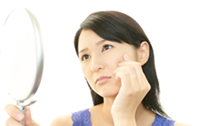
People in their 40s who get implants must also consider 10, 20 and even 30 years in the future.So you say that you are missing 2 molars.
I will tell you about partial dentures for 2 teeth made through our most requested process, Riegel telescope. Normally, dentures covered by insurance are supported by metal springs. They are esthetically inferior and tend to move around a lot. Our dentures made using Riegel telescope feature locking equipment that makes putting in and taking out dentures simple by using an opening and closing mechanism. This means that our dentures do not have metal springs.
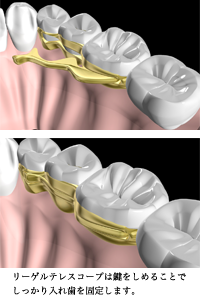 Since dentures covered by health insurance grip the teeth with metal springs, the subduction sensation (movement) that accompanies biting can be quite noticeable. Since this pressure is transferred directly to the teeth, they are wiggled and may come loose. Compare this to a 2-tooth linking and fixing dentures that uses Riegel telescope as a foundation layered doubly over the teeth. By locking the mechanism your partial dentures will stay firmly in place. Dentures made using the Riegel telescope method only move about 300 microns when biting. And since the teeth supporting the dentures only absorb 120 microns of that movement, there is virtually no burden on the teeth. A firm bite and pleasing esthetics are special characteristics of these dentures.
Since dentures covered by health insurance grip the teeth with metal springs, the subduction sensation (movement) that accompanies biting can be quite noticeable. Since this pressure is transferred directly to the teeth, they are wiggled and may come loose. Compare this to a 2-tooth linking and fixing dentures that uses Riegel telescope as a foundation layered doubly over the teeth. By locking the mechanism your partial dentures will stay firmly in place. Dentures made using the Riegel telescope method only move about 300 microns when biting. And since the teeth supporting the dentures only absorb 120 microns of that movement, there is virtually no burden on the teeth. A firm bite and pleasing esthetics are special characteristics of these dentures.
In recent years dentures have been developed in which the metal clasps (springs) have been replaced with invisible silicon-type parts. But it is hard to say much about their history and cases treated with them. Even if dentures look nice, they are meaningless if you cannot secure a firm and comfortable bite.
Some sites advertise 'If they don't fit right then you can return them'. But I have reservations recommending a product that can be so easily made and returned.
Since the technology used to create dentures using the Riegel telescope method is so precise, in some cases the manufacturing process can take as long as 2 or 3 months. These are implements order-made to the exact contours of our patients' mouths so it can take some time. But I can confidently say that you will be able to use Riegel telescope dentures firmly as if they were your own teeth.

